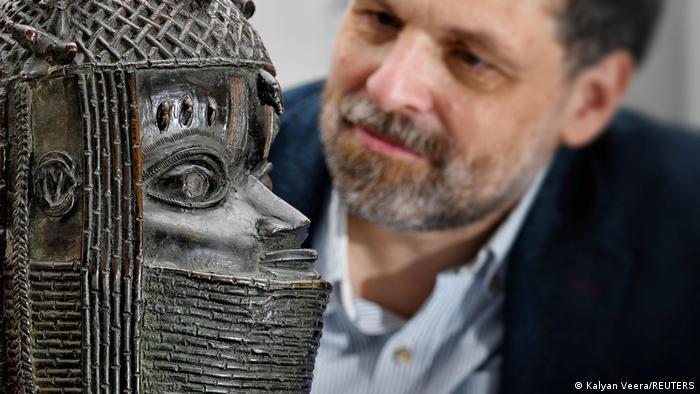Restitution of Colonial Looted Art is Only the Start

This Benin bronze was recently returned to Nigeria from the University of Aberdeen
Thirty-four years — that's how long Germany's colonial rule in Africa lasted.
If you take France, which for example had colonies in Africa until the early 1960s, this period may seem comparatively short. But these 34 years were enough to traumatize people in the occupied territories, to commit the first genocide of the 20th century, namely the massacre of the Herero and Nama people in what is now Namibia, and together with other colonial powers, to rob an entire continent of its cultural heritage.
Experts estimate that between 80% and 90% of Africa's cultural heritage is stored in European museums or their repositories.
But there is more at stake here than "just" art and everyday objects. When Europeans plundered Africa's treasures to fill their new ethnological museums in a veritable competition, they devastated entire towns and villages and erased the collective memory of entire nations.
Turning point after long-delayed debate
The fact that Europeans are now beginning to return objects from — as it is euphemistically called — "colonial contexts of injustice" is long overdue, especially since the discussion is not new. Prompted by the restitution demands of African intellectuals, Europe's politicians and museum experts were already discussing how to deal with this delicate "heritage" 40 years ago. But African representatives were not invited to these negotiations.
The basic tenor at the time was that the pieces were better off in Europe, protected from environmental effects and decay. It was believed that Africa was incapable of protecting those pieces. It was an openly racist discourse that led to no result.
In this respect, Benedicte Savoy, one of the leading art historians in the field of looted art, rightly speaks of a turning point. In an interview with DW last year, she even likened the change in the restitution debate to the fall of the Berlin Wall.
In November, France made a start by returning 26 works of art from the former Kingdom of Dahomey to present-day Benin in a ceremonial act of state. Germany will follow suit this year and begin returning the more than 1,000 Benin bronzes that are stored in various museums in the country. Among other things, they should be prominently displayed in the newly opened Humboldt Forum. Most of the valuable bronzes originate from a looting operation by British troops in 1897.
Colonial structures persist
The restitution of looted art is a start, but it must not and cannot stop there. For example, when are we going to start "giving back" Africa's raw materials? Be it coltan, bauxite or diamonds, transnational corporations continue to profit from Africa's mineral resources. However, little of this wealth reaches local populations. This unequal balance of power is also a remnant of colonial rule.
Or consider the reservations regarding the production of COVID-19 vaccines. The fact that South Africa is now embarking on producing mRNA vaccines invalidates arguments often made earlier that there is a lack of expertise and suitable production facilities outside of Europe and North America. This, too, is a racist discourse. At its core, it resembles the view museum professionals had 40 years ago about the lack of protection and care for artifacts in Africa.
Germany's colonial rule in Africa lasted 34 years. More than a century later, we are only at the beginning of a long process with the restitution of looted art and cultural objects. Perhaps this will eventually lead to "cooperation on an equal footing," as is often called for by Western politicians regarding Africa.
This article was originally in German
Get the latest reports & analysis with people's perspective on Protests, movements & deep analytical videos, discussions of the current affairs in your Telegram app. Subscribe to NewsClick's Telegram channel & get Real-Time updates on stories, as they get published on our website.















